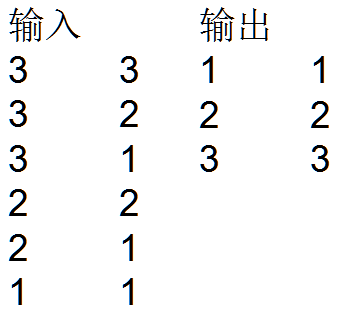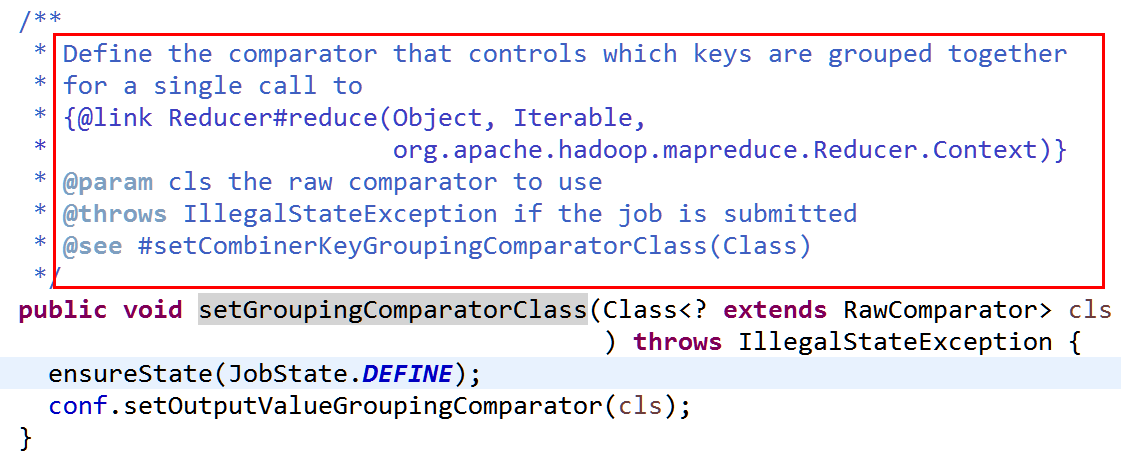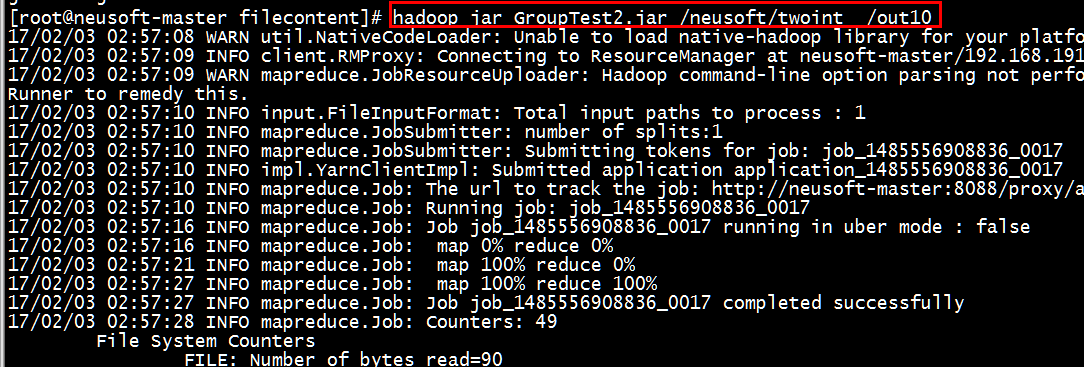MapReduce分组
- 分组:相同key的value进行分组
例子:如下输入输出,右边的第一列没有重复值,第二列取得是当第一列相同时第二例取最大值

分析:首先确定<k3,v3>,k3的选择两种方式,
方法1.前两列都作为k3
方法2.两列分别是k3和v3,此种情况的k2和v2分别是那些,第一列为k2,第二列为v2,但是最后如何无法转化为k3,v3呢,思路是从v2s中取值最大的,此种情况不能取值。
第一部分:方法二达到任务目的
(1)自定义Mapper
1 private static class MyMapper extends Mapper<LongWritable, Text, IntWritable, IntWritable>{ 2 IntWritable k2= new IntWritable(); 3 IntWritable v2= new IntWritable(); 4 @Override 5 protected void map(LongWritable key, Text value, 6 Mapper<LongWritable, Text, IntWritable, IntWritable>.Context context) 7 throws IOException, InterruptedException { 8 String[] splited = value.toString().split("\t"); 9 k2.set(Integer.parseInt(splited[0])); 10 v2.set(Integer.parseInt(splited[1])); 11 context.write(k2, v2); 12 } 13 }
(2)自定义Reduce
//按照k2進行排序,分組(分为3各组,reduce函数被调用3次,分几组调用几次)
//分组为3-{3,2,1}, 2-{2,1},1-{1}
1 private static class MyReducer extends Reducer<IntWritable, IntWritable, IntWritable, IntWritable>{ 2 IntWritable v3 = new IntWritable(); 3 @Override 4 protected void reduce(IntWritable k2, Iterable<IntWritable> v2s, 5 Reducer<IntWritable, IntWritable, IntWritable, IntWritable>.Context context) 6 throws IOException, InterruptedException { 7 int max=Integer.MIN_VALUE; 8 for (IntWritable v2 : v2s) { 9 if (v2.get()>max) { 10 max=v2.get(); 11 } 12 } 13 //每个组求得一个最大值可得到结果的序列 14 v3.set(max); 15 context.write(k2, v3); 16 } 17 }
(3)组合MapReduce
1 public static void main(String[] args) throws Exception { 2 Job job = Job.getInstance(new Configuration(), GroupTest.class.getSimpleName()); 3 job.setJarByClass(GroupTest.class); 4 //1.自定义输入路径 5 FileInputFormat.setInputPaths(job, new Path(args[0])); 6 //2.自定义mapper 7 //job.setInputFormatClass(TextInputFormat.class); 8 job.setMapperClass(MyMapper.class); 9 //job.setMapOutputKeyClass(Text.class); 10 //job.setMapOutputValueClass(TrafficWritable.class); 11 12 //3.自定义reduce 13 job.setReducerClass(MyReducer.class); 14 job.setOutputKeyClass(IntWritable.class); 15 job.setOutputValueClass(IntWritable.class); 16 //4.自定义输出路径 17 FileOutputFormat.setOutputPath(job, new Path(args[1])); 18 //job.setOutputFormatClass(TextOutputFormat.class);//对输出的数据格式化并写入磁盘 19 20 job.waitForCompletion(true); 21 }
由此,完整的代码如下:

1 package Mapreduce; 2 3 import java.io.IOException; 4 5 import org.apache.hadoop.conf.Configuration; 6 import org.apache.hadoop.fs.Path; 7 import org.apache.hadoop.io.IntWritable; 8 import org.apache.hadoop.io.LongWritable; 9 import org.apache.hadoop.io.Text; 10 import org.apache.hadoop.mapreduce.Job; 11 import org.apache.hadoop.mapreduce.Mapper; 12 import org.apache.hadoop.mapreduce.Reducer; 13 import org.apache.hadoop.mapreduce.lib.input.FileInputFormat; 14 import org.apache.hadoop.mapreduce.lib.output.FileOutputFormat; 15 16 public class GroupTest { 17 public static void main(String[] args) throws Exception { 18 Job job = Job.getInstance(new Configuration(), GroupTest.class.getSimpleName()); 19 job.setJarByClass(GroupTest.class); 20 //1.自定义输入路径 21 FileInputFormat.setInputPaths(job, new Path(args[0])); 22 //2.自定义mapper 23 //job.setInputFormatClass(TextInputFormat.class); 24 job.setMapperClass(MyMapper.class); 25 //job.setMapOutputKeyClass(Text.class); 26 //job.setMapOutputValueClass(TrafficWritable.class); 27 28 //3.自定义reduce 29 job.setReducerClass(MyReducer.class); 30 job.setOutputKeyClass(IntWritable.class); 31 job.setOutputValueClass(IntWritable.class); 32 //4.自定义输出路径 33 FileOutputFormat.setOutputPath(job, new Path(args[1])); 34 //job.setOutputFormatClass(TextOutputFormat.class);//对输出的数据格式化并写入磁盘 35 36 job.waitForCompletion(true); 37 } 38 private static class MyMapper extends Mapper<LongWritable, Text, IntWritable, IntWritable>{ 39 IntWritable k2= new IntWritable(); 40 IntWritable v2= new IntWritable(); 41 @Override 42 protected void map(LongWritable key, Text value, 43 Mapper<LongWritable, Text, IntWritable, IntWritable>.Context context) 44 throws IOException, InterruptedException { 45 String[] splited = value.toString().split("\t"); 46 k2.set(Integer.parseInt(splited[0])); 47 v2.set(Integer.parseInt(splited[1])); 48 context.write(k2, v2); 49 } 50 } 51 //按照k2進行排序,分組(分为3各组,reduce函数被调用3次,分几组调用几次) 52 //分组为3-{3,2,1}, 2-{2,1},1-{1} 53 private static class MyReducer extends Reducer<IntWritable, IntWritable, IntWritable, IntWritable>{ 54 IntWritable v3 = new IntWritable(); 55 @Override 56 protected void reduce(IntWritable k2, Iterable<IntWritable> v2s, 57 Reducer<IntWritable, IntWritable, IntWritable, IntWritable>.Context context) 58 throws IOException, InterruptedException { 59 int max=Integer.MIN_VALUE; 60 for (IntWritable v2 : v2s) { 61 if (v2.get()>max) { 62 max=v2.get(); 63 } 64 } 65 //每个组求得一个最大值可得到结果的序列 66 v3.set(max); 67 context.write(k2, v3); 68 } 69 } 70 }
(4)测试代码运行结果
- [root@neusoft-master filecontent]# hadoop jar GroupTest.jar /neusoft/twoint /out9
- [root@neusoft-master filecontent]# hadoop jar -text /out9/part-r-00000
- [root@neusoft-master filecontent]# hadoop dfs -text /out9/part-r-00000

第二部分:方法一达到任务目的
前两列都作为k3,无v3,由此类推,k2也是前两列
但是如果采用默认分组的话,上述数据集分为6组,无法达到同样的数值取得最大值的目的。
由此,利用Mapreduce的自定义分组规则,使得第一列相同的数值可以在一个组里面,从而正确的分组。
MapReduce提供了job.setGroupingComparatorClass(cls);其中cls是自定义分组的类

(1) 从源代码可知,该类需要继承RawComparator类,自定义分组代码如下:
1 //分组比较--自定义分组 2 private static class MyGroupingComparator implements RawComparator { 3 public int compare(Object o1, Object o2) { 4 return 0;//默认的比较方法 5 } 6 //byte[] b1 表示第一个参数的输入字节表示,byte[] b2表示第二个参数的输入字节表示 7 //b1 The first byte array. 第一个字节数组, 8 //b1表示前8个字节,b2表示后8个字节,字节是按次序依次比较的 9 //s1 The position index in b1. The object under comparison's starting index.第一列开始位置 10 //l1 The length of the object in b1.第一列长度 ,在这里表示长度8 11 //提供的数据集中的k2一共48个字节,k2的每一行的TwoInt类型表示8字节(t1和t2分别为4字节) 12 public int compare(byte[] b1, int s1, int l1, byte[] b2, int s2, int l2) { 13 //compareBytes是按字节比较的方法,其中k2表示的是两列,第一列比较,第二例不比较 14 //第一个字节数组的前四个字节和第二个字节数组的前四个字节比较 15 //{3,3},{3,2},{3,1},{2,2},{2,1},{1,1} 16 //比较上述六组的每组的第一个数字,也就是比较twoint中得t1数值 17 //现在就根据t1可分成3个组了{3,(3,2,1)}{2,(2,1)}{1,1} 18 //之后再从v2中取出最大值 19 return WritableComparator.compareBytes(b1, s1, l1-4, b2, s2, l2-4); 20 } 21 22 }
(2)主函数中调用
//当没有下面的自定义分组的话,会调用k2的compareto方法执行k2的比较,如果自定义了分组类则使用自定义分组类 job.setGroupingComparatorClass(MyGroupingComparator.class);
(3)根据比较函数个字段的含义,可以得到v2的类型为intwritable,而不是nullwritable,v2是由第二列的数组成的集合
Mapper函数如下:
1 private static class MyMapper extends 2 Mapper<LongWritable, Text, TwoInt, IntWritable> { 3 //这里的v2需要改为IntWritable而不是nullwritable 4 TwoInt K2 = new TwoInt(); 5 IntWritable v2= new IntWritable(); 6 @Override 7 protected void map(LongWritable key, Text value, 8 Mapper<LongWritable, Text, TwoInt, IntWritable>.Context context) 9 throws IOException, InterruptedException { 10 String[] splited = value.toString().split("\t"); 11 K2.set(Integer.parseInt(splited[0]), Integer.parseInt(splited[1])); 12 v2.set(Integer.parseInt(splited[1])); //要比较第二列,需要将第二列的值赋值为v2 13 context.write(K2, v2); 14 } 15 }
(4)k3和v3的类型为reduce输出的类型,均为intwritable类型,但是如何根据得到的v2去统计其中相同key的value中得最大值呢?
1 private static class MyReducer extends 2 Reducer<TwoInt, IntWritable, IntWritable, IntWritable> {//k2,v2s,k3,v3 3 IntWritable k3 = new IntWritable(); 4 IntWritable v3 = new IntWritable(); 5 @Override 6 protected void reduce( 7 TwoInt k2, 8 Iterable<IntWritable> v2s, 9 Reducer<TwoInt, IntWritable, IntWritable, IntWritable>.Context context) 10 throws IOException, InterruptedException { 11 int max=Integer.MIN_VALUE; 12 for (IntWritable v2 : v2s) { 13 if (v2.get()>max) { 14 max=v2.get(); 15 } 16 } 17 //每个组求得一个最大值可得到结果的序列 18 v3.set(max); 19 k3.set(k2.t1);//k2的第一列作为k3,因为k2为Twoint类型 20 context.write(k3,v3); 21 } 22 }
最终的代码如下:

1 package Mapreduce; 2 3 import java.io.DataInput; 4 import java.io.DataOutput; 5 import java.io.IOException; 6 7 import org.apache.hadoop.conf.Configuration; 8 import org.apache.hadoop.fs.Path; 9 import org.apache.hadoop.io.IntWritable; 10 import org.apache.hadoop.io.LongWritable; 11 import org.apache.hadoop.io.NullWritable; 12 import org.apache.hadoop.io.RawComparator; 13 import org.apache.hadoop.io.Text; 14 import org.apache.hadoop.io.WritableComparable; 15 import org.apache.hadoop.io.WritableComparator; 16 import org.apache.hadoop.mapreduce.Job; 17 import org.apache.hadoop.mapreduce.Mapper; 18 import org.apache.hadoop.mapreduce.Reducer; 19 import org.apache.hadoop.mapreduce.lib.input.FileInputFormat; 20 import org.apache.hadoop.mapreduce.lib.output.FileOutputFormat; 21 22 23 public class Group2Test { 24 public static void main(String[] args) throws Exception { 25 Job job = Job.getInstance(new Configuration(), 26 Group2Test.class.getSimpleName()); 27 job.setJarByClass(Group2Test.class); 28 // 1.自定义输入路径 29 FileInputFormat.setInputPaths(job, new Path(args[0])); 30 // 2.自定义mapper 31 job.setMapperClass(MyMapper.class); 32 //这里的k2,v2和k3,v3不同,需要显式定义k2和v2类型 33 job.setMapOutputKeyClass(TwoInt.class); 34 job.setMapOutputValueClass(IntWritable.class); 35 36 //当没有下面的自定义分组的话,会调用k2的compareto方法执行k2的比较,如果自定义了分组类则使用自定义分组类 37 job.setGroupingComparatorClass(MyGroupingComparator.class); 38 39 // 3.自定义reduce 40 job.setReducerClass(MyReducer.class); 41 job.setOutputKeyClass(IntWritable.class); 42 job.setOutputValueClass(IntWritable.class); 43 // 4.自定义输出路径 44 FileOutputFormat.setOutputPath(job, new Path(args[1])); 45 46 job.waitForCompletion(true); 47 } 48 //分组比较--自定义分组 49 private static class MyGroupingComparator implements RawComparator { 50 public int compare(Object o1, Object o2) { 51 return 0;//默认的比较方法 52 } 53 //byte[] b1 表示第一个参数的输入字节表示,byte[] b2表示第二个参数的输入字节表示 54 //b1 The first byte array. 第一个字节数组, 55 //b1表示前8个字节,b2表示后8个字节,字节是按次序依次比较的 56 //s1 The position index in b1. The object under comparison's starting index.第一列开始位置 57 //l1 The length of the object in b1.第一列长度 ,在这里表示长度8 58 //提供的数据集中的k2一共48个字节,k2的每一行的TwoInt类型表示8字节(t1和t2分别为4字节) 59 public int compare(byte[] b1, int s1, int l1, byte[] b2, int s2, int l2) { 60 //compareBytes是按字节比较的方法,其中k2表示的是两列,第一列比较,第二例不比较 61 //第一个字节数组的前四个字节和第二个字节数组的前四个字节比较 62 //{3,3},{3,2},{3,1},{2,2},{2,1},{1,1} 63 //比较上述六组的每组的第一个数字,也就是比较twoint中得t1数值 64 //现在就根据t1可分成3个组了{3,(3,2,1)}{2,(2,1)}{1,1} 65 //之后再从v2中取出最大值 66 return WritableComparator.compareBytes(b1, s1, l1-4, b2, s2, l2-4); 67 } 68 69 } 70 71 private static class MyMapper extends 72 Mapper<LongWritable, Text, TwoInt, IntWritable> { 73 //这里的v2需要改为IntWritable而不是nullwritable 74 TwoInt K2 = new TwoInt(); 75 IntWritable v2= new IntWritable(); 76 @Override 77 protected void map(LongWritable key, Text value, 78 Mapper<LongWritable, Text, TwoInt, IntWritable>.Context context) 79 throws IOException, InterruptedException { 80 String[] splited = value.toString().split("\t"); 81 K2.set(Integer.parseInt(splited[0]), Integer.parseInt(splited[1])); 82 v2.set(Integer.parseInt(splited[1])); 83 context.write(K2, v2); 84 } 85 } 86 87 private static class MyReducer extends 88 Reducer<TwoInt, IntWritable, IntWritable, IntWritable> {//k2,v2s,k3,v3 89 IntWritable k3 = new IntWritable(); 90 IntWritable v3 = new IntWritable(); 91 @Override 92 protected void reduce( 93 TwoInt k2, 94 Iterable<IntWritable> v2s, 95 Reducer<TwoInt, IntWritable, IntWritable, IntWritable>.Context context) 96 throws IOException, InterruptedException { 97 int max=Integer.MIN_VALUE; 98 for (IntWritable v2 : v2s) { 99 if (v2.get()>max) { 100 max=v2.get(); 101 } 102 } 103 //每个组求得一个最大值可得到结果的序列 104 v3.set(max); 105 k3.set(k2.t1);//k2的第一列作为k3,因为k2为Twoint类型 106 context.write(k3,v3); 107 } 108 } 109 110 private static class TwoInt implements WritableComparable<TwoInt> { 111 public int t1; 112 public int t2; 113 114 public void write(DataOutput out) throws IOException { 115 out.writeInt(t1); 116 out.writeInt(t2); 117 } 118 119 public void set(int t1, int t2) { 120 this.t1 = t1; 121 this.t2 = t2; 122 } 123 124 public void readFields(DataInput in) throws IOException { 125 this.t1 = in.readInt(); 126 this.t2 = in.readInt(); 127 } 128 129 public int compareTo(TwoInt o) { 130 if (this.t1 == o.t1) { // 當第一列相等的時候,第二列升序排列 131 return this.t2 - o.t2; 132 } 133 return this.t1 - o.t1;// 當第一列不相等的時候,按第一列升序排列 134 } 135 @Override 136 public String toString() { 137 return t1 + "\t" + t2; 138 } 139 } 140 }
测试并运行结果如下:
[root@neusoft-master filecontent]# hadoop dfs -text /out9/part-r-00000

[root@neusoft-master filecontent]# hadoop dfs -text /out10/part-r-00000

结果是正确无误的。
END~



 浙公网安备 33010602011771号
浙公网安备 33010602011771号